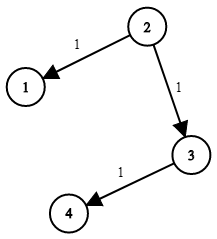743. Network Delay Time
You are given a network of n nodes, labeled from 1 to n. You are also given times, a list of travel times as directed edges times[i] = (ui, vi, wi), where ui is the source node, vi is the target node, and wi is the time it takes for a signal to travel from source to target.
We will send a signal from a given node k. Return the time it takes for all the n nodes to receive the signal. If it is impossible for all the n nodes to receive the signal, return -1.
1
2
3
4
| Example 1:
Input: times = [[2,1,1],[2,3,1],[3,4,1]], n = 4, k = 2
Output: 2
|

1
2
3
4
| Example 2:
Input: times = [[1,2,1]], n = 2, k = 1
Output: 1
|
1
2
3
4
| Example 3:
Input: times = [[1,2,1]], n = 2, k = 2
Output: -1
|
Constraints:
- 1 <= k <= n <= 100
- 1 <= times.length <= 6000
- times[i].length == 3
- 1 <= ui, vi <= n
- ui != vi
- 0 <= wi <= 100
- All the pairs (ui, vi) are unique. (i.e., no multiple edges.)
Solution#
1
2
3
4
5
6
7
8
9
10
11
12
13
14
15
16
17
18
19
20
21
22
23
24
25
26
27
28
29
30
31
32
33
34
35
36
37
38
39
40
41
42
43
44
45
46
47
48
49
50
51
52
53
54
55
56
57
58
59
60
61
62
63
64
65
66
67
68
69
70
71
72
73
74
75
76
| class Solution {
public int networkDelayTime(int[][] times, int n, int k) {
int[] costs = new int[n + 1];
Arrays.fill(costs, -1);
costs[k] = 0;
Queue<int[]> q = new PriorityQueue<int[]>((a, b) -> a[1] - b[1]);
q.add(new int[]{k, 0});
List<Integer>[] visited = new List[n + 1];
while (!q.isEmpty()) {
int[] x = q.poll();
for (int[] time: times) {
if (x[0] == time[0]) {
if (visited[x[0]] == null) {
visited[x[0]] = new ArrayList<>();
visited[x[0]].add(x[0]);
}
if (visited[x[0]].contains(time[1])) {
continue;
}
visited[x[0]].add(time[1]);
int newTime = x[1] + time[2];
int prevTime = costs[time[1]];
if (prevTime == -1 || newTime < prevTime) {
costs[time[1]] = newTime;
}
q.add(new int[]{time[1], costs[time[1]]});
}
}
}
int maxTime = 0;
for (int i = 1; i < costs.length; i++) {
if (costs[i] == -1) {
return -1;
}
maxTime = Math.max(maxTime, costs[i]);
}
return maxTime;
}
}
class Solution {
// Belman-Ford
public int networkDelayTime(int[][] times, int n, int s) {
int[] d = new int[n + 1];
Arrays.fill(d, Integer.MAX_VALUE);
d[s] = 0;
for (int i = 1; i < n + 1; i++) {
for (int j = 0; j < times.length; j++) {
int[] e = times[j];
int a = e[0];
int b = e[1];
int w = e[2];
if (d[a] != Integer.MAX_VALUE) {
d[b] = Math.min(d[b], d[a] + w);
}
}
}
int max = 0;
for (int i = 1; i < d.length; i++) {
int t = d[i];
if (t == Integer.MAX_VALUE) return -1;
max = Math.max(max, t);
}
return max;
}
}
|
Solution 2021-12-07 Bellman-Ford/Dikjstra#
1
2
3
4
5
6
7
8
9
10
11
12
13
14
15
16
17
18
19
20
21
22
23
24
25
26
27
28
29
30
31
32
33
34
35
36
37
38
39
40
41
42
43
44
45
46
47
48
49
50
51
52
53
54
55
56
57
58
59
60
61
| class Solution {
// Dikjstra
public int networkDelayTime(int[][] times, int n, int k) {
Map<Integer, Map<Integer, Integer>> g = new HashMap<>();
for (int[] time: times) {
g.putIfAbsent(time[0], new HashMap<>());
g.get(time[0]).put(time[1], time[2]);
}
Queue<int[]> q = new PriorityQueue<>((a,b) -> a[0] - b[0]);
q.add(new int[] {0, k});
int[] visited = new int[n + 1];
int res = 0;
while (q.size() > 0) {
int[] curr = q.poll();
int node = curr[1];
int dist = curr[0];
if (visited[node] == 1) continue;
// System.out.println("visit " + node + " " + dist);
res = dist;
visited[node] = 1;
n--;
if (g.containsKey(node)) {
for (Integer next: g.get(node).keySet()) {
int nextWeight = g.get(node).get(next);
q.add(new int[] {dist + nextWeight, next});
}
}
}
return n == 0 ? res: -1;
}
// Bellman-Ford
public int networkDelayTime2(int[][] times, int n, int k) {
int[] dist = new int[n + 1];
Arrays.fill(dist, Integer.MAX_VALUE);
dist[k] = 0;
for (int i = 0; i < n; i++) {
for (int[] time: times) {
int u = time[0];
int v = time[1];
int w = time[2];
if (dist[u] != Integer.MAX_VALUE) {
dist[v] = Math.min(dist[v], dist[u] + w);
}
}
}
int max = 0;
for (int i = 1; i < dist.length; i++) {
int v = dist[i];
if (v == Integer.MAX_VALUE) return -1;
max = Math.max(v, max);
}
return max;
}
}
|
